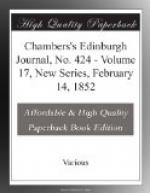‘Now, you know my history,’ continued she. ’It is a tragedy of real life, which you will do well, young painter, to compare with your own!’ With a kindly pressure of the hand, and a gentle smile—oh! so sweet, so pure, and heavenly!—Julia Reay left me; while I sat perfectly awed—that is the only word I can use—with the revelation which she had made both of her history and of her own grand soul.
‘Come with me to my study,’ said Mr Reay, entering the room; ’I have a world to talk to you about. You go to-morrow, you say. I am sorry for it; but I must therefore settle my business with you in good time to-day.’
I followed him mechanically, for I was undergoing a mental castigation which rather disturbed me. Indeed, like a young fool—as eager in self-reproach as in self-glorification—I was so occupied in inwardly calling myself hard names, that even when my host gave me a commission for my new picture, ‘The Return of Columbus,’ at two hundred and fifty pounds, together with an order to paint himself, Mrs Reay, and half-a-dozen of their children, I confess it with shame, that I received the news like a leaden block, and felt neither surprise nor joy—not though these few words chased me from the gates of the Fleet, whither I was fast hastening, and secured me both position and daily bread. The words of that beautiful girl were still ringing in my ears, mixed up with the bitterest self-accusations; and these together shut out all other sound, however pleasant. But that was always my way.
I went back to London, humbled and yet strengthened, having learned more of human nature and the value of events, in one short fortnight, than I had ever dreamed of before. The first lessons of youth generally come in hard shape. I had sense enough to feel that I had learned mine gently, and that I had cause to be thankful for the mildness of the teaching. From a boy, I became a man, judging more accurately of humanity than a year’s ordinary experience would have enabled me to do. And the moral which I drew was this: that under our most terrible afflictions, we may always gain some spiritual good, if we suffer them to be softening and purifying rather than hardening influences over us. And also, that while we are suffering the most acutely, we may be sure that others are suffering still more acutely; and if we would but sympathise with them more than with ourselves—live out of our ownselves, and in the wide world around us—we would soon be healed while striving to heal others. Of this I am convinced: the secret of life, and of all its good, is in love; and while we preserve this, we can never fail of comfort. The sweet waters will always gush out over the sandiest desert of our lives while we can love; but without it—nay, not the merest weed of comfort or of virtue would grow under the feet of angels. In this was the distinction between Mrs Arden and Julia Reay. The one had hardened her heart under her trials, and shut it up in itself; the other had opened hers to the purest love of man and love of God; and the result was to be seen in the despair of the one and in the holy peace of the other.




